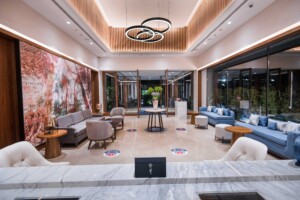By Ar. Anil Badan, Founder and Principal Architect of Studio B Architects.
The goal of every hotelier is to provide an unforgettable experience to the guests while they stay in. But, what if hotels seek to go beyond the conventional comfortable rooms with views or jacuzzi-equipped bathrooms? The solution lies in the integration of technology in hotels, creating a smart room, to enhance the overall guest experience. From online research to web check-ins, technology is making its way into every aspect of the hotel room, offering convenience to the guests and the hotel staff. These rooms are now equipped with enhanced options and personalised luxury. In this article, the author shares insights on smart room automation in hotels and how they are elevating the user experience with modern needs.
The Concept of Smart Rooms
A smart room is more than just a space equipped with a TV and quick internet! It is a network of linked equipment and systems that offers each visitor a customised experience. The earliest technological advancements in hotels, such as electronic key cards and online reservation platforms, are where the concept of smart rooms is incepted. IoT has also made its way into the hospitality sector, making rooms more connected and controlled for features like heating, lighting, and entertainment.
Seamless Integration and Personalisation
Smart room automation lies in the principle of inter-connectivity through a unified platform or a mobile application. This helps guests to manage various features of their room like lighting, entertainment and security. From dimming lights to controlling the temperature, smart room enhances the guest experience with comfort and autonomy. Further, smart rooms elevate the level of personalisation in the stay. By analysing data and behaviour, hotels can pre-set the rooms with optimum temperature and lights, comforting the guests the moment they step in!
Streamlined Operations and Maintenance
Smart room automation helps the hotel staff with maintenance and other operations. Centralised monitoring systems, allow staff to minimise downtime and increase efficiency. Moreover, predictive maintenance algorithms enable repairs and keep the rooms in optimum condition. This reduces maintenance costs and solves potential issues before they escalate, allowing hotels to operate more efficiently and profitably.
IoT in Hotel Rooms
IoT helps hoteliers and users to make informed decisions, tailored services, and effective strategies for improved satisfaction and growth. Through smartphones or wearables, IoT makes safe keyless entry possible, giving visitors easy access to their rooms while boosting convenience. Energy usage is optimised in lighting, heating, and cooling by the use of IoT in hospitality. This strategy allows businesses to lower expenses and encourage sustainable hotel operations. In addition, it provides information on the locality, crowd management, transportation options, and other tourist attractions to visitors, making their research easier.
What Would the Future Look Like?
Advancements in artificial intelligence, machine learning, and analytics will enhance the idea of smart room automation. Further, smart assistants will offer a customised solution, enabling connectivity and interaction. This will deliver a more personalised and immersive experience to the guests.
In essence, smart room automation is an upgrade to the hotel’s infrastructure and a commitment to the future of hospitality. So, let us embrace the thought of technology and innovation in smart rooms, ensuring that guests enjoy memorable and satisfying stays that exceed their expectations!
About the Author: Ar. Anil Badan, Founder and Principal Architect of Studio B Architects, in the realm of hospitality design. His user-centric approach and innovative spirit have birthed iconic projects like Cloud Nine and the Ramada Plaza, Varanasi.






